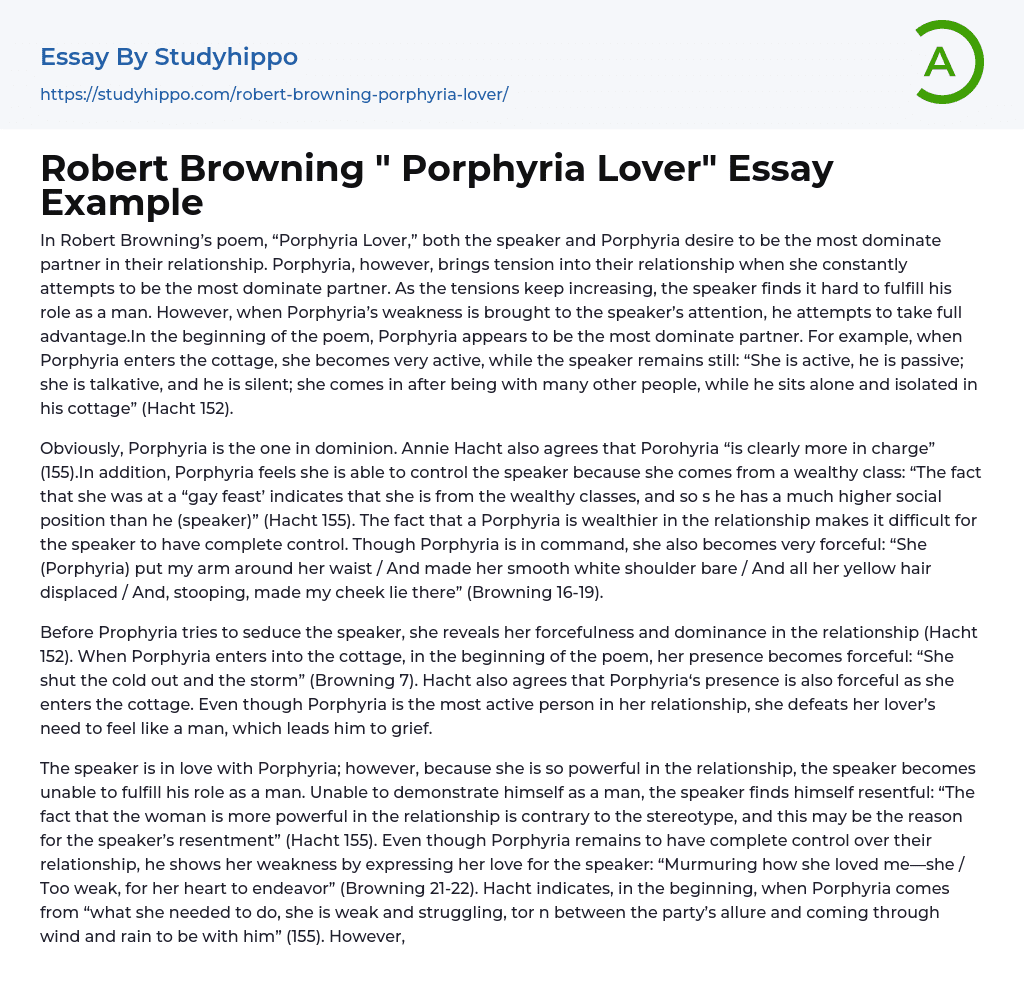In Robert Browning's "Porphyria Lover" poem, both the speaker and Porphyria have a desire to dominate their relationship. But Porphyria constantly trying to be the most dominant creates tension. This makes it difficult for the speaker to fulfill his role as a man, and he struggles to meet Porphyria's expectations. However, when the speaker is made aware of Porphyria's weakness, he seizes the opportunity. Initially, Porphyria appears to be the more dominant partner, as seen by her active and talkative behavior compared to the speaker's passivity and silence. Adding to this dynamic is Porphyria's socializing outside of their relationship while the speaker remains isolated in their cottage (Hacht 152).
Porphyria clearly has the upper hand in the relationship, as noted by both the speaker and Annie Hacht who agrees that Porphyria is "clearly more in charge" (155). Part of Porphyr
...ia's dominance comes from her higher social class, which is demonstrated by her attendance at a "gay feast." As a result of her wealth and higher social position, the speaker finds it difficult to have complete control. However, Porphyria's dominance can also be seen in her forcefulness, such as when she puts the speaker's arm around her waist and exposes her shoulder and hair, ultimately making him rest his cheek on it (Browning 16-19).
According to Hacht (152), before attempting to seduce the speaker, Porphyria establishes her dominance and forcefulness in the relationship. Browning's poem portrays Porphyria's forceful nature when she enters the cottage and shuts out the cold and storm (7). Hacht concurs that Porphyria's presence is forceful throughout the cottage scene. Despite being the more active partner in the relationship, Porphyria ultimately undermines her lover's sens
of masculinity, leaving him to experience grief.
The speaker is infatuated with Porphyria, but due to her dominant role in their relationship, the speaker feels emasculated. This causes resentment, as it goes against the traditional gender roles. Despite Porphyria's control, the speaker notes her vulnerability when she expresses her love for him. Initially, Porphyria struggles between her obligations and being with the speaker. However, when she demonstrates her devotion, the speaker takes advantage of the opportunity to gain complete control. (Hacht 155)
The speaker regained control and felt his manhood restored, leading him to kill Porphyria to ensure her love for him would be everlasting. "Perfectly pure and good," he carried out the act by winding her hair around her throat three times and experienced no remorse for it (Browning 37-41). Annie Hacht points out that the killing reverses the roles between the speaker and Porphyria, establishing his dominance (155). He justifies his actions by believing he captured the essence of their relationship (Hacht 156).
Thus, the speaker opts to murder his lover willingly, for the sake of attaining control over her and their relationship. In "Porphyria's Lover" by Robert Browning, both lovers are entrapped within the grip of possessing absolute control. Browning's portrayal of Porphyria with dominance and the speaker with madness highlights the repercussions of an unsteady relationship. The characters remain oblivious to the damage they inflict upon each other and their union.
- Book Summary essays
- Metaphor essays
- Reader essays
- Rhyme essays
- Literary devices essays
- Villain essays
- Books essays
- Genre essays
- Literary Criticism essays
- Writer essays
- Protagonist essays
- Simile essays
- Poem essays
- Book Report essays
- Book Review essays
- Greek Mythology essays
- Plot essays
- Tragic Hero essays
- Coming of Age essays
- Play essays
- Rhetoric essays
- Rhetorical Question essays
- Translation essays
- Understanding essays
- Reason essays
- Character essays
- Letter essays
- American Literature essays
- Literature Review essays
- Utopia essays
- Poetry Analysis essays
- Dante's Inferno essays
- Between The World and Me essays
- Incidents in The Life of a Slave Girl essays
- Flowers for Algernon essays
- Myth essays
- Everyday Use essays
- Boo Radley essays
- Genesis essays
- Richard iii essays
- Alice in Wonderland essays
- On the road essays
- Ozymandias essays
- The Nightingale essays
- Holden Caulfield essays
- Animal Farm essays
- 1984 essays
- A Hanging essays
- Shooting An Elephant essays
- A Tale Of Two Cities essays




